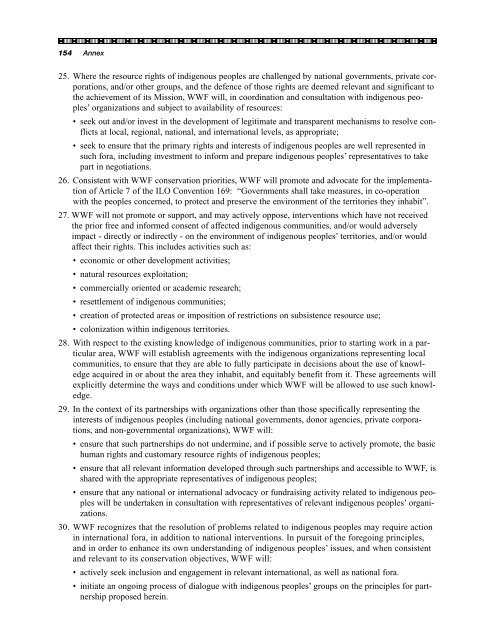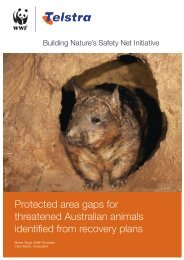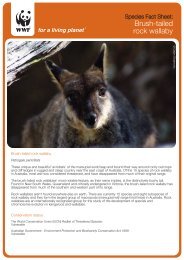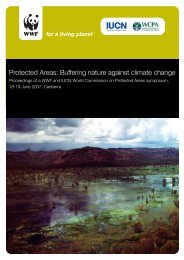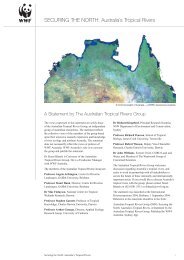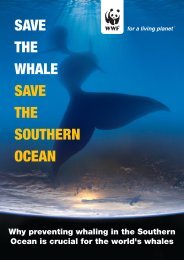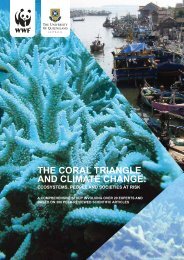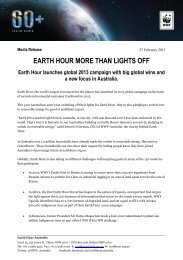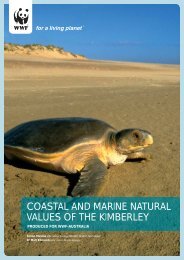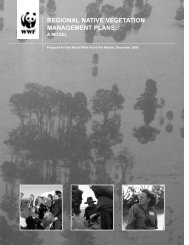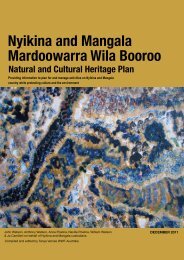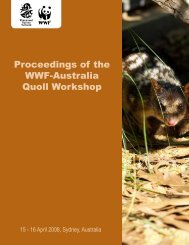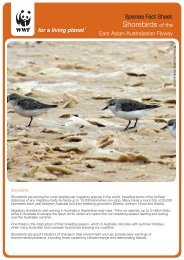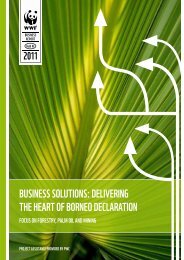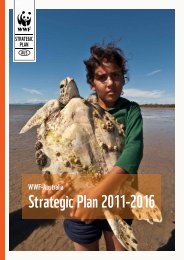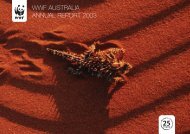Indigenous Peoples and Conservation Organizations
Indigenous Peoples and Conservation Organizations
Indigenous Peoples and Conservation Organizations
Create successful ePaper yourself
Turn your PDF publications into a flip-book with our unique Google optimized e-Paper software.
154 Annex<br />
25. Where the resource rights of indigenous peoples are challenged by national governments, private corporations,<br />
<strong>and</strong>/or other groups, <strong>and</strong> the defence of those rights are deemed relevant <strong>and</strong> significant to<br />
the achievement of its Mission, WWF will, in coordination <strong>and</strong> consultation with indigenous peoples’<br />
organizations <strong>and</strong> subject to availability of resources:<br />
• seek out <strong>and</strong>/or invest in the development of legitimate <strong>and</strong> transparent mechanisms to resolve conflicts<br />
at local, regional, national, <strong>and</strong> international levels, as appropriate;<br />
• seek to ensure that the primary rights <strong>and</strong> interests of indigenous peoples are well represented in<br />
such fora, including investment to inform <strong>and</strong> prepare indigenous peoples’ representatives to take<br />
part in negotiations.<br />
26. Consistent with WWF conservation priorities, WWF will promote <strong>and</strong> advocate for the implementation<br />
of Article 7 of the ILO Convention 169: “Governments shall take measures, in co-operation<br />
with the peoples concerned, to protect <strong>and</strong> preserve the environment of the territories they inhabit”.<br />
27. WWF will not promote or support, <strong>and</strong> may actively oppose, interventions which have not received<br />
the prior free <strong>and</strong> informed consent of affected indigenous communities, <strong>and</strong>/or would adversely<br />
impact - directly or indirectly - on the environment of indigenous peoples’ territories, <strong>and</strong>/or would<br />
affect their rights. This includes activities such as:<br />
• economic or other development activities;<br />
• natural resources exploitation;<br />
• commercially oriented or academic research;<br />
• resettlement of indigenous communities;<br />
• creation of protected areas or imposition of restrictions on subsistence resource use;<br />
• colonization within indigenous territories.<br />
28. With respect to the existing knowledge of indigenous communities, prior to starting work in a particular<br />
area, WWF will establish agreements with the indigenous organizations representing local<br />
communities, to ensure that they are able to fully participate in decisions about the use of knowledge<br />
acquired in or about the area they inhabit, <strong>and</strong> equitably benefit from it. These agreements will<br />
explicitly determine the ways <strong>and</strong> conditions under which WWF will be allowed to use such knowledge.<br />
29. In the context of its partnerships with organizations other than those specifically representing the<br />
interests of indigenous peoples (including national governments, donor agencies, private corporations,<br />
<strong>and</strong> non-governmental organizations), WWF will:<br />
• ensure that such partnerships do not undermine, <strong>and</strong> if possible serve to actively promote, the basic<br />
human rights <strong>and</strong> customary resource rights of indigenous peoples;<br />
• ensure that all relevant information developed through such partnerships <strong>and</strong> accessible to WWF, is<br />
shared with the appropriate representatives of indigenous peoples;<br />
• ensure that any national or international advocacy or fundraising activity related to indigenous peoples<br />
will be undertaken in consultation with representatives of relevant indigenous peoples’ organizations.<br />
30. WWF recognizes that the resolution of problems related to indigenous peoples may require action<br />
in international fora, in addition to national interventions. In pursuit of the foregoing principles,<br />
<strong>and</strong> in order to enhance its own underst<strong>and</strong>ing of indigenous peoples’ issues, <strong>and</strong> when consistent<br />
<strong>and</strong> relevant to its conservation objectives, WWF will:<br />
• actively seek inclusion <strong>and</strong> engagement in relevant international, as well as national fora.<br />
• initiate an ongoing process of dialogue with indigenous peoples’ groups on the principles for partnership<br />
proposed herein.


